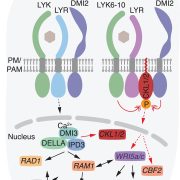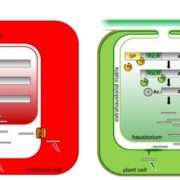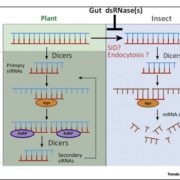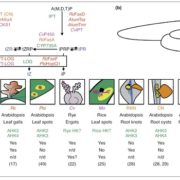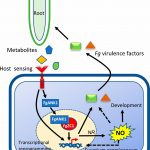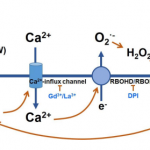A moonlighting kinase induces immune responses in rice and Arabidopsis ($) (Plant Physiol.)
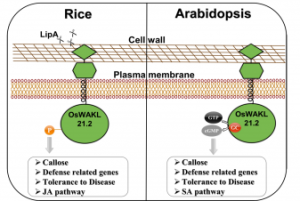 Bacterial infections are a serious issue for crop plants and it is thus imperative to understand the mechanisms employed by plants to develop resistance against pathogens. Malukani et al. have identified a receptor kinase in rice, WALL-ASSOCIATED KINASE-LIKE 21 (OsWAKL21.2) that perceives pathogen-induced damage to the plant cell wall. Overexpression of this kinase in rice brings about immune responses, including up-regulation of key genes involved in resistance against bacterial pathogens. The authors find it to be a moonlighting kinase that possesses guanylate cyclase (GS) activity too (the term moonlighting is an expression used for something that has two jobs). Quite interestingly, the activity of this enzyme seems to be species-specific – while kinase activity is essential for immune responses in rice, it displays GS activity when expressed in Arabidopsis thaliana to trigger immune responses. Further analyses seem to suggest that this enzyme could target two different pathways in the two species – jasmonic acid (JA)-mediated pathways in rice and salicylic acid (SA)-mediated pathways in Arabidopsis. (Summary by Pavithran Narayanan @pavi_narayanan) Plant Physiol. 10.1104/pp.19.01579
Bacterial infections are a serious issue for crop plants and it is thus imperative to understand the mechanisms employed by plants to develop resistance against pathogens. Malukani et al. have identified a receptor kinase in rice, WALL-ASSOCIATED KINASE-LIKE 21 (OsWAKL21.2) that perceives pathogen-induced damage to the plant cell wall. Overexpression of this kinase in rice brings about immune responses, including up-regulation of key genes involved in resistance against bacterial pathogens. The authors find it to be a moonlighting kinase that possesses guanylate cyclase (GS) activity too (the term moonlighting is an expression used for something that has two jobs). Quite interestingly, the activity of this enzyme seems to be species-specific – while kinase activity is essential for immune responses in rice, it displays GS activity when expressed in Arabidopsis thaliana to trigger immune responses. Further analyses seem to suggest that this enzyme could target two different pathways in the two species – jasmonic acid (JA)-mediated pathways in rice and salicylic acid (SA)-mediated pathways in Arabidopsis. (Summary by Pavithran Narayanan @pavi_narayanan) Plant Physiol. 10.1104/pp.19.01579


